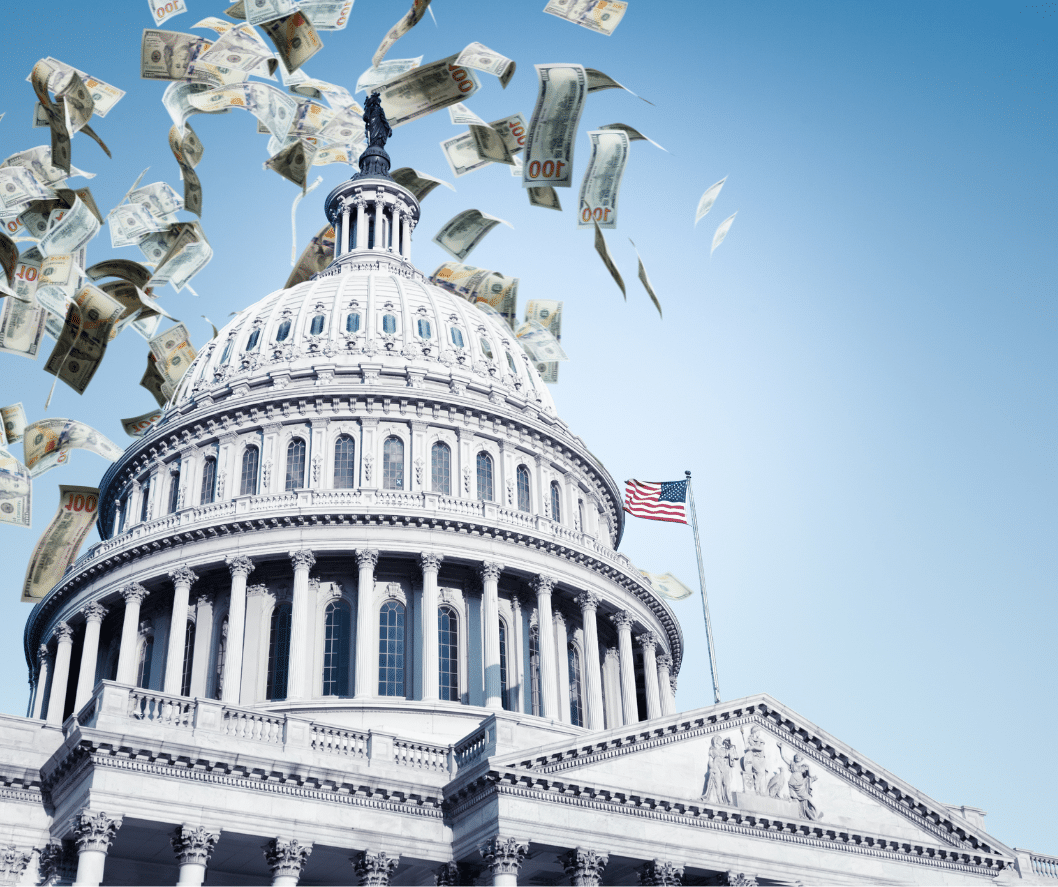In one of the most expensive and egregious recent holiday traditions, Congress once again showered special interests with tax breaks through a $40 billion add-on to the fiscal year 2020 spending package. Passage of the bill marks the sixth time in the last decade Congress has re-animated a set of “temporary” tax provisions for certain niche interests, known collective as ‘tax extenders.’ While most provisions in the package are perennial taxpayer pariahs, like expensing rules for racehorses and motorsports tracks, there are a couple new features of the extenders this time around, including retroactivity to an unprecedented extent.
To be clear, there were plenty of changes to the tax code littered throughout the 3,823-page spending bill. Some have gotten attention, like the repeal of the medical device tax, the ‘Cadillac’ health plan tax, and the heath insurance provider’s tax that collectively will cost taxpayers $373 billion over 10 years. Others, like changes to rules for retirement savings account for community newspapers and graduate students, have seen fewer headlines. The ‘extenders’ described here, however, are only those in Div. Q of H.R. 1865. And because they haven’t been part of earlier extender packages, we’re also excluding the 10 tax breaks created in the bill under the heading ‘Disaster Tax Relief.’
Overall, Div. Q of the bill is very similar to H.R. 3301, which was introduced by the House Ways and Means Committee in June. Most of the provisions in package expired at the end of 2017. When the President signs the spending package, most will be extended retroactively for all of 2018 and 2019 as well as extended for 2020. This means rewarding certain interest groups for decisions they made almost two years ago! Retroactive tax breaks don’t help the economy retroactively, they can’t change the economic decisions of the past. They simply waste taxpayers’ money subsidizing economic activity that occurred in their absence.
There are a handful of differences between the newest extenders package and the bill from last summer. The beneficiaries of every tax extender lobby intensely for even more generous tax treatment, but only a few managed to succeed in getting some changes into the bill. So these are the interest groups with the best lobbyists for bilking taxpayers:
- Railroads
- Railroad owners get a tax credit for up to 50 percent of all spending on track maintenance. The provision was originally extended through 2020 like the rest, but managed to get an extra two years in the final package. According to the JCT, the extension through 2022 will cost taxpayers $1.1 billion – $418 more than the extension through 2020.
- Racehorse owners
- The provision was likely left out of the House bill as a point of leverage for later negotiations with the Senate led by a certain Senator from a home state known for its horses (aka Senate Majority Leader McConnell (R-KY)). The provision in the final bill is expected to have no revenue effect, according to the Joint Committee on Taxation.
- Biodiesel & Renewable diesel producers
- The $1/gallon biodiesel credits is the single most expensive extender (see more here). Instead of an extension through 2020 like most other energy extenders, the subsidy for biodiesel producers was extended through 2022 in the final bill at a total cost of $15.2 billion.
- Wind power producers
- Producers of electricity from certain sources, including wind, geothermal, biomass, hydropower, and others can get a production tax credit (PTC) for every KWh they produce. Or, the energy property owners can elect to take an investment tax credit (ITC) for 30% of the costs of building the property in lieu of the PTC. In the tax extenders package tacked onto the FY2016 Omnibus, the credits for wind power were singled out for a longer extension and phaseout by the end of 2019. It was supposed to be the end of the Wind PTC. But lawmakers have been only too eager to extend the credit at a reduced rate for another year. In H.R. 3301, the wind PTC/ITC were extended through 2020 at the last phaseout level – reduced by 60 percent. But by the time the final package was passed, someone bumped that up to the normal credit reduced by just 40 percent. The extension of the ITC and PTC for all renewable sources was scored at $2.1 billion.
- Rich people
- In the 2017 Tax Act, Congress lifted the exemption for the gift and estate tax from $5 million to $10 million for 2018-2025. The amount is indexed to inflation, so $11.2 million was actually shielded from the tax in 2018, for example. H.R. 3301 attempted to pay for most of its other extensions by shortening the window for the increased estate and gift tax exemption to the end of 2022, rather than 2025. That got tossed overboard in the final extenders package, which according to the JCT means taxpayers won’t recoup up to $37.6 billion in lost revenue.
In addition, several other provisions were new to the House’s bill in the summer, H.R. 3301, and remained in the final package. One of these was an extension of the ‘New Markets’ tax credit which gives a credit of 39 percent of an indirect investment to a “qualified active low-income community business.” The credit was typically capped at $3.5 million. This year’s extenders package, however, increases the cap to $5 million in addition to extending it through 2020. In total the credit’s increase and extension will cost taxpayers $1.5 billion.
One of the many reasons the 2017 Tax Act wasn’t true tax reform was that it failed to resolve the wasteful and tiresome practice of tax extenders. In fact, it created new “temporary” provisions that are now nearing their expiration date. Among these is a spate of credits for those in the booze business that made it into spending bill, cementing their place as new extenders. The nine provisions reduce the excise tax rate on beer, wine, and spirits, outline when certain booze can be transferred without incurring a tax, and simplify rules for tax record-keeping. Altogether, the provisions originally cost $4.2 billion in the 2017 Tax Act. Now, their one-year extension is expected to cost taxpayers an additional $950 million.
A complete list of the tax provisions and their score in the spending bill is available for download here. The extenders portion is Division Q, which starts on page 3.
| Provision | 10-yr. cost of extension ($, millions) |
| Exclusion from gross income of discharge of qualified principal residence indebtedness. | -2,283 |
| Mortgage insurance premiums treated as qualified residence interest. | -1,253 |
| Temporary reduction in medical expense deduction floor | -3,629 |
| Above-the-line deduction for qualified tuition and related expenses. | -664 |
| Black Lung Disability Trust Fund excise tax, increased rate | 162 |
| Indian employment credit | -199 |
| Railroad track maintenance credit | -1,065 |
| Mine Rescue Team Training Credit | -7 |
| Classification of certain race horses as 3-yr property | |
| 7-year recovery period for motorsports entertainment complexes | -187 |
| Accelerated depreciation for business property on an Indian reservation | -159 |
| Special expensing rules for certain [TV & film] productions | -18 |
| Empowerment zone tax incentives | -830 |
| American Samoa economic development credit | -25 |
| New Markets Tax Credit | -1,468 |
| Employer Credit for Paid Family and Medical Leave | -2,237 |
| Work Opportunity Credit | -2,042 |
| Extension of certain provisions related to beer, wine, and distilled spirits | |
| a. Special rule for the production period for beer, wine, and distilled spirits | -10 |
| b. Modifying the rates of taxation of beer and certain other rules | -125 |
| c. Modifying the rates of taxation of wine and certain other rules | -176 |
| d. Modifying the rates of taxation of distilled spirits and certain other rules | -640 |
| e. Simplification of rules regarding records, statements, and returns | |
| Look-thru for related controlled foreign corporations | -673 |
| Credit for health insurance costs of eligible individuals | -43 |
| Special Rule to Implement FERC or Electric Transmission Restructuring | |
| Credit for Construction of Energy Efficient New Homes | -788 |
| Credit for Nonbusiness Energy Property | -846 |
| Alternative Fuel Vehicle Refueling Property | -331 |
| Incentives for Alternative Fuel and Alternative Fuel Mixtures | -1,978 |
| Incentives for Biodiesel and Renewable Diesel | -15,183 |
| Credit for Electric Drive Motorcycles | -3 |
| Cellulosic Biofuel Producer Credit | -43 |
| Credit for Production of Indian Coal | -113 |
| Construction Date for Eligible Facilities (Including Wind) to Claim the Electricity Production Credit | -2,060 |
| Election to Claim the Energy Credit in Lieu of the Electricity Production Credit | |
| Special Depreciation Allowance for Cellulosic Biofuel Plant Property | |
| Energy efficient commercial buildings deduction | -223 |
| Alternative motor vehicle credit for qualified fuel cell vehicles | -14 |
| Total | -39,153 |










